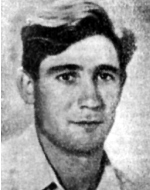Son of Zippora and Zerach, members of Moshav Nahalal, was born on May 29, 1925. He completed elementary school and two additional classes in his village and took courses in the moshav movement. And from his many trips around the country he would bring exhibits to the natural collections of his school, revealing that he knew not only to observe and absorb all the sounds and events in the universe, but also to express them in vivid descriptions and poetic beauty. On the other hand, Adir wanted to gather strength in order to atone with his contemporaries for the misdeeds of ancient Jews And far away, and indeed the attempts by Arabs in the vicinity of his village to harm Jewish honor and Jewish labor would teach them a courageous lesson in force and courage, for the days when such attacks could be continued without punishment were over. In the Second World War, when his older brother volunteered to fight the Germans, Nahum, then 16, was forced to give up his desire to join him as well, and he went to all the farm jobs instead of his brother. He began to teach the students and students of the agricultural school, and from the age of 16 onward he continued to instruct the students and students of the agricultural school . He joined the Haganah at an early age. He completed a commanding officer course, was a commander in the Gadna, and was an active Haganah commander. When his brother returned from the army, Nahum devoted himself to organizational work in the moshav youth, and he also excelled in his skill and his ability to express himself. Meanwhile, he continued to do his part in the service of the homeland. He participated in aliyah to Biriya and other operations. On Black Sabbath (29.6.1946) he was in Degania Bet, fighting with the British soldiers, and only a whole class was able to occupy them with great effort and with the cost of bruises and blows. In the detention camp in Rafah he prepared his escape despite the danger, but on the day he decided to carry out his escape he was released. In 1947 he completed a naval course in the Palmach, preparing himself to bring immigrants to the beach. At the end of the year, he was elected to the Youth Committee of the Moshavim Movement and was involved, among other things, in organizing youth from moshavim for settlement, and mainly trying to guide them to settle on the shore of Eilat. In February 1948, he enlisted in the service of the Homeland in the Golani Brigade. He participated in the conquest of Bethlehem of Galilee (Waldheim) and in other battles, graduated cum laude with honors and was appointed commander of a course for commanders. Upon the invasion of the Arab armies he went as commander of the platoon to the Jordan Valley front and participated in the defense of the grains and Ein Gev and in the raid through the Sea of Galilee to an Arab village, in the battles of Sha’ar Hagolan and more, and later in battles over Jenin. When he spoke about the dangers of war, he would say, “What do you think, Mother, a war without sacrifices? He participated in battles in the vicinity of Nazareth and in the “Hiram” operation to liberate the Galilee, and in all of these activities he excelled in his coolness and dedication to the work he performed, instilled confidence in his subordinates and they liked him and followed him without hesitation. In the fall of 1948, he underwent an armor course with the rank of lieutenant and as deputy commander of an armored company, who embarked on Operation Horev, and was also the commander of the force that invaded Abasan on the night of December 22-23, 1948, as part of the deception effort in the western sector Of the front, after the freakThe armored vehicle he was traveling in was hit and seriously injured in the head and fell on December 23, 1948. He was buried by the Egyptians with the “body of a Jewish commander.” After three weeks , On the 12th of Tevet 5709 (12.1.1949), was transferred to eternal rest in the cemetery in Nahalal, and his memory was included in a special booklet in the “Ella Habanim” library founded by the movement of moshavim.
